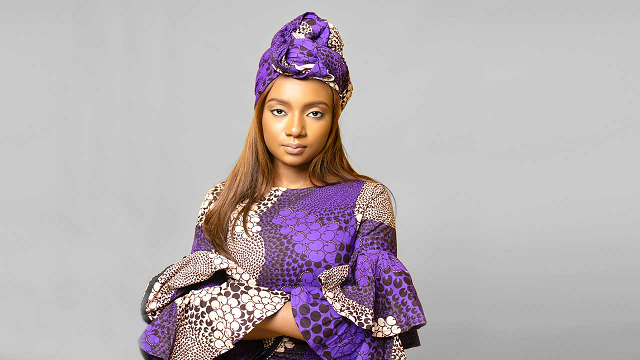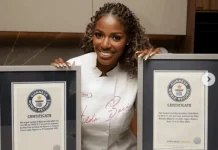The World Should Be Made Safer So That Women Can Maintain Their Agency And Gain More Participation
Maryam Laushi is a communication specialist and activist and has been one of the most vocal Northern voices raising awareness on gender equality, social justice and youth inclusion in politics in recent times. This, she has done through writing, projects on advocacy for women and as a pioneer member of the Not Too Young To Run leadership team. Her principled activism has generated debate and dialogue about numerous social issues and has attracted national attention.
A graduate of Communications, Advertising and Marketing, she volunteers for several non-profits, including Youth Initiative for Advocacy, Growth and Advancement (YIAGA). In 2017, she emerged as one of the awardees of the SME100 Nigeria’s 25 under-25 award for Active Citizenry and the Under 30s award for politics and governance.
A firm believer in a greater future for Nigeria where young people and women would play critical roles in building a bright future for the country, she talks about her journey into activism, being a pioneer member of Not Too Young To Run Movement, factors that keep women away from active politics amongst other issues.
What led you into activism, specifically Not Too Young To Run (NTYTR) leadership?
I grew up with a father who often talked about ill leadership and how Nigerians suffer for it and that definitely shaped the way I looked at the world. I care about people, the earth and everything that will reduce the inequalities that harm people. As I grew older, I could see all the ways exclusion and discrimination made life more difficult for different demographic groups. I read and spoke about it often and I guess that organically led me into activism. As a young woman, I fall into two groups that are often excluded from decision-making, and decision-making shapes our society, country and world and so I knew that supporting the “Not Too Young to Run” was sensible to me and easily drew me in.
NTYTR claims it has produced the country’s youngest lawmaker, is this really true?
Yes. At about 27 years old, the young man in Akwa Ibom would not have won or even had the opportunity to run if the bill hadn’t been passed. The constitution stated that the age one could become eligible to run for the State House of Assembly and the House of Representatives was 30, and now thanks to NTYTR, the age is 25 allowing a younger group of people the opportunity to participate in the political process by running and there are many more beneficiaries to the law.
Yes, it bothers me for many reasons. First, it appears we are hardly making progress when it comes to women in leadership, in comparison to countries like Rwanda, Liberia and Ethiopia. Second, there needs to be better representation for women so that our laws can improve in terms of protecting women and fostering a more egalitarian society and I will be collaborating with a few organizations to improve these numbers. I am also a trustee in a couple of organizations that seek to get citizens, including women, to participate more in the political space, one of such is 67million.
Of the 109 Senate seats contested in the last election, women occupy just 7 and 22 of the 360 HoR seats, one of the poorest numbers in Africa. How can we move past lip service and improve this number come 2023?
We need a rallying head to develop a program that will guarantee increased female participation in politics and governance. Ideally, this should be the Ministry of Women Affairs. There are many foreign aid organizations that are working on improving this statistic, therefore, collaboration and leadership will go a long way.
There should be orientation in schools, institutions and social groups in terms of our way of thinking regarding women in leadership. Laws should be put in place to protect women who seek to hold leadership positions, while training and other resources should be provided for women as well, to equip them even more with what it takes to make excellent leaders.
Women also need to play their part in the process by properly occupying political parties so that they’re not given token positions, but given space to democratically contest to become candidates.
You are presently the National Publicity Secretary of the MDP. Do you have political ambitions in the nearest future?
For now, I have no ambitions, but one day, if the time and atmosphere is right, I will consider it. And if I were to do so, I would do my best to serve the people if I am their choice.
Tell us some of the issues that keep women away from active partisan politics and how we can solve them?
There are many barriers for women but I will briefly touch on a couple. Patriarchy in culture that tells us a woman’s place is not in leadership is one of the problems we have. Many women also do not feel safe engaging in politics, or they face restrictions from family and society.
Once those close to her do not support her, it becomes a major struggle to resist the powers, therefore, some women prefer not to pursue it further. Other women may also stand in the way, upholding ideas that limit and restrict all women and girls from attaining their full potential. When we create safer cities for women and bring the message of empowering women to lawmakers, social institutions and children in schools, our norms will begin to change for the better.
As a passionate women’s advocate, how are you speaking for the average marginalised northern woman?
I think I live my life everyday with that question. Many of the decisions and risks I take are inspired by the plight of the Northern Nigerian woman. I use every platform available to me mostly to speak on the liberation of the Northern Nigerian woman. With issues such as child marriage, female genital mutilation and more, there are so many challenges we face. Through social media and other opportunities where my voice can be heard, I have and will continuously speak and act in any capacity available to me, to shed light on the negatives so they can change and also promote the positives so that they can be respected and appreciated.
You say young people will play critical roles in building a bright future for the country; do you think this is possible with today’s crop of youths?
Today’s youth have been shaped as a result of a system that has failed them. It is hard to get a good education, financial independence or even expect positive outcomes generally. Regardless, I have witnessed the awakening of this generation in many different ways and even in professional environments.
Without our young people, we have no hope because of the sheer size of the population and the unavoidable succession that must happen. However, there are numerous able and passionate young people who are able to take this country where it needs to be. It is down to the change agents to push far enough, young leaders to stand up and older leaders to collaborate, mentor and support. It is a critical time and we must speak and work towards the goal, which ultimately is, development and a better future for generations to come
Several quarters have accused activists of only partaking in activism to get noticed by politicians, is this assertion true?
I have to admit that I have witnessed pretense and ulterior motives with some people in activism. It is a trend at the moment, people do it for various reasons and usually they make a little progress, but we’ll keep pushing until we see the change that is needed. However, it is the same in almost every other space in society. You will find hypocrites and fraudsters so I encourage everyone to apply wisdom, gain knowledge and weed out those who are harming people instead of helping, by pretending to be activists who care about the plight of the people.
Do you think Nigeria is ripe for a female president?
I’ll answer this by asking, “is Nigeria ripe for a good leader?” The gender should not matter if the quality of the person speaks. If the best character for this position is a woman, then Nigeria is ripe because all we want is someone who will do right by the people. Man or woman. If it happens to be a woman, I hope Nigeria will pick her when she emerges.
Tell us something that has influenced your life and career positively today?
My education. I have a BA in Advertising and Media, MA in Marketing Management and MSc in Marketing Management and Communication. Having been to university and business school in England and France, my imagination, ambition, knowledge and vision has vastly opened up; engaging with communities in Nigeria has also opened up my mind and way of thinking. Also, my books have some influence on me, I am curious about the world and books help to satisfy some of that curiosity, they have influenced my career, understanding, life and outlook. Also, the various mentors I have learnt from over the years.

Who and what inspires you?
People who pushed the boundaries and created a change that could not have been imagined before their time inspire me. Some of these people are Thomas Sankara who believed in the revolution in his time and the liberation of the African woman, Martin Luther King Jr who stood with peace even in the face of intimidation and violence, Beyoncé for putting in so much work over so many years consistently, Amina J Mohammed who has attained a great height while being true to herself and many more. I also find inspiration in everyday people, family and friends, art and even nature.
If you had the chance to change something for Nigerian women, what would that be?
Safer cities for women. I came across a UN Habitat manual that delves into building safer cities for women, involving everything from safety with law enforcement to allowing more community involvement and free movement for women so they can move about without fear.
This guide also highlights including women in the decision-making that affects their safety. Oftentimes women lack agency and freedom to work or participate in various social spaces and excel. One of the most cited reasons for exclusion of women not just politically but economically and much more, in my experience, is ‘safety’.
Decisions on where to go, what to do, who to marry, what and where to study, how to dress and much more are made for women by gatekeepers of society under this idea that the world outside the home is not safe for women.
What do you do to relax? What is your guilty pleasure?
Well, I do a few things to relax and one of my favourite is working out. Going to the gym, hiking outdoors, those things keep me strong and healthy, I love to read about everything that seems interesting to me, fiction and non-fiction because this satisfies my curiosity and provides much needed escapism, I watch Netflix a lot and I like to listen to rap music.
What last words would you leave with women inspired by you?
Everyone was created for a special and amazing purpose. I think sometimes, as women, we lose sight of that because it is easy to get caught up in day-to-day activities but it is okay to push the boundaries.
There is greatness to be attained and I encourage women to strive for that, in business, art, fashion, academia, religious institutions, professions, politics and everywhere else. I spoke to a 27-year-old lady in Gombe who told me I inspired her to run for office and she may not have won but I am so pleased to be the person that inspires the idea of such possibilities and goals for some women.
Thomas Sankara said, “The revolution and women’s liberation go together. We do not talk of women’s emancipation as an act of charity or because of a surge of human compassion. It is a basic necessity for the triumph of the revolution. Women hold up the other half of the sky”. I really hope both men and women will collaborate for a more inclusive society, for the prosperity and development of our dear nation.
Source: Guardian












